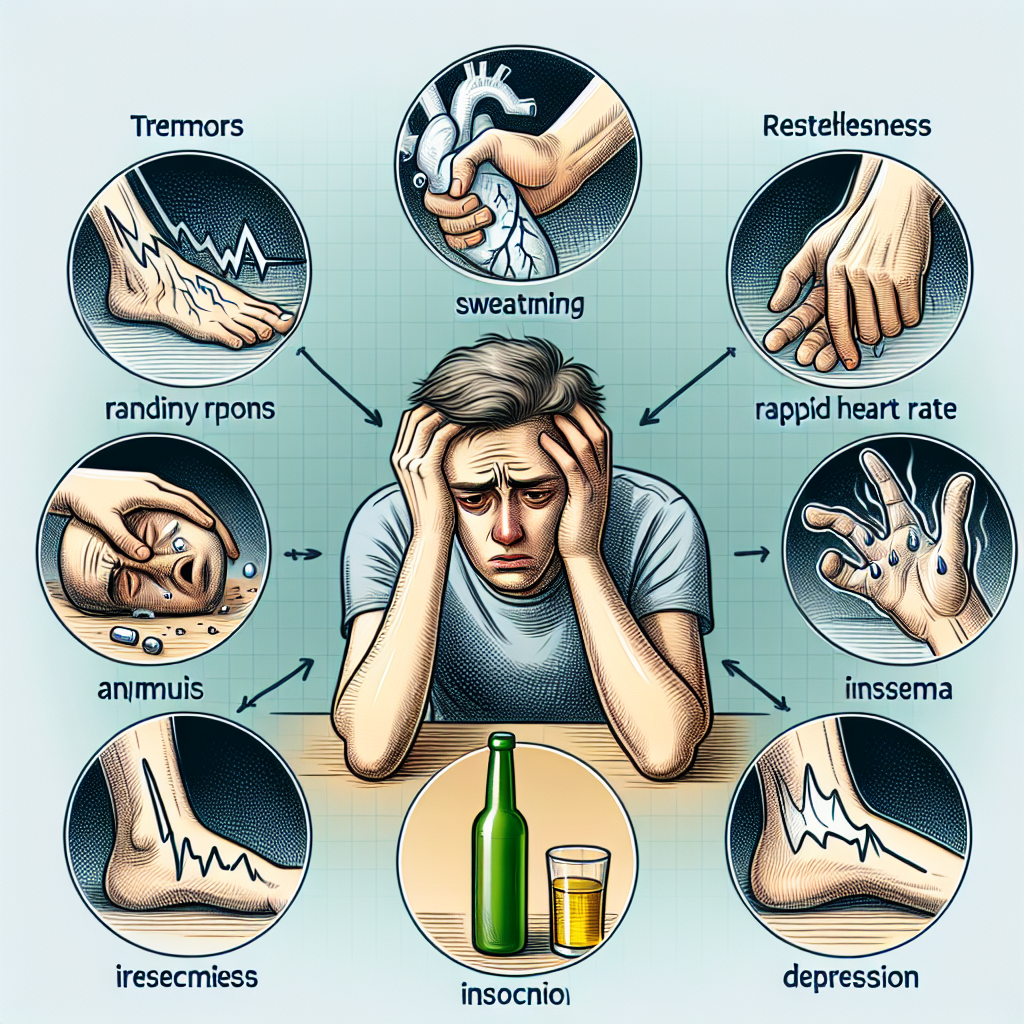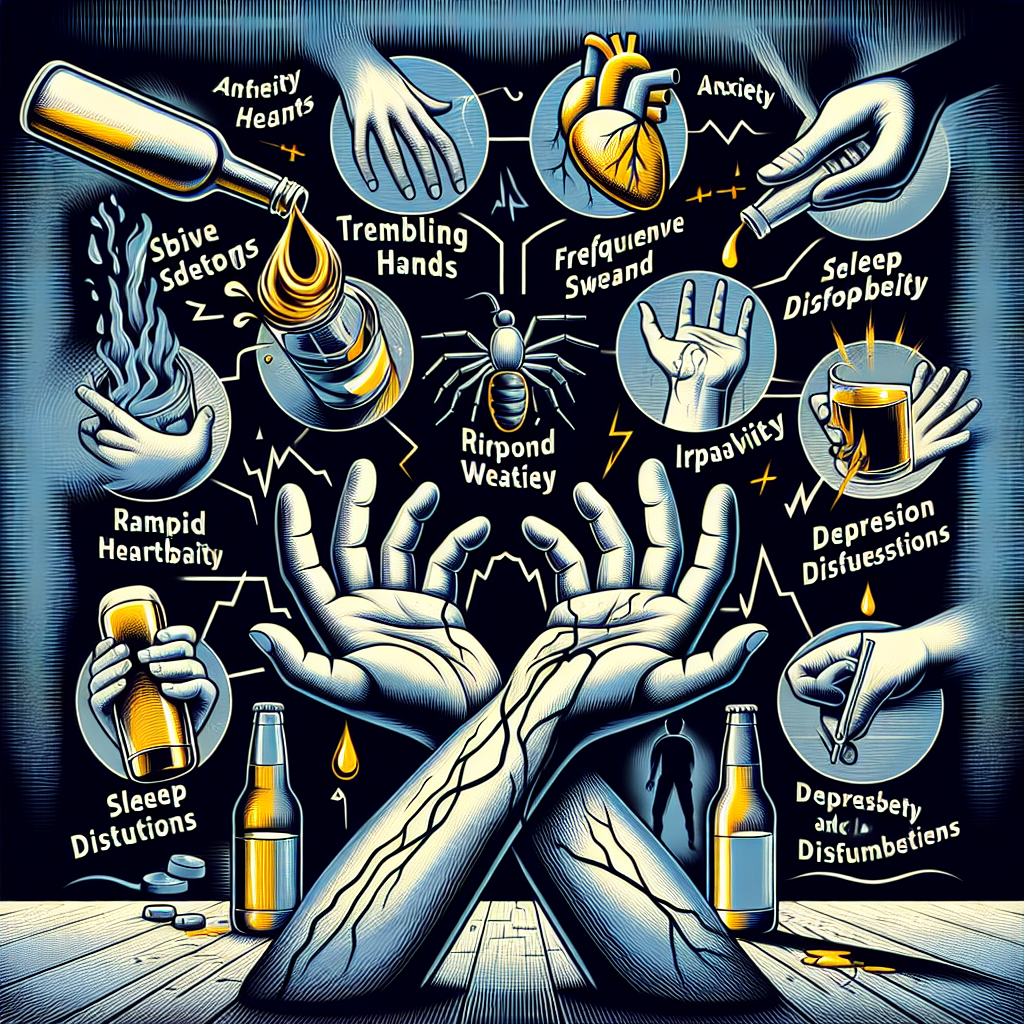-
Table of Contents

“Alcohol Withdrawal: Navigating the Storm of Physical Pain and Emotional Turmoil.”
Introduction
Alcohol withdrawal can have a profound impact on both the body and mind, manifesting in a range of physical and emotional symptoms. Physically, individuals may experience tremors, sweating, nausea, vomiting, headaches, and increased heart rate. Severe cases can lead to more serious conditions such as seizures and delirium tremens, which can be life-threatening. Emotionally, withdrawal can cause anxiety, irritability, depression, and mood swings. These symptoms arise as the body attempts to adjust to the absence of alcohol, which it has become dependent on. Understanding these effects is crucial for managing withdrawal safely and effectively.
Physical Effects of Alcohol Withdrawal: Symptoms and Management
Alcohol withdrawal can be a daunting experience, both physically and emotionally. Understanding the physical effects of alcohol withdrawal and how to manage them is crucial for anyone embarking on the journey to sobriety. The physical symptoms of alcohol withdrawal can range from mild to severe, and they often begin within hours of the last drink. These symptoms can include tremors, sweating, nausea, vomiting, headaches, and an increased heart rate. In more severe cases, individuals may experience seizures, hallucinations, and delirium tremens, a potentially life-threatening condition characterized by confusion, rapid heartbeat, and fever.
The onset of these symptoms can be alarming, but it is important to remember that they are a natural part of the body’s process of detoxifying and healing itself. The severity and duration of withdrawal symptoms can vary depending on factors such as the length and intensity of alcohol use, overall health, and individual differences in physiology. Typically, the most intense symptoms occur within the first 24 to 72 hours after the last drink, but some symptoms can persist for weeks or even months.
Managing the physical effects of alcohol withdrawal requires a combination of medical supervision, supportive care, and self-care strategies. Medical supervision is essential, especially for individuals with a history of heavy drinking or those experiencing severe symptoms. Healthcare professionals can provide medications to alleviate withdrawal symptoms, such as benzodiazepines to reduce anxiety and prevent seizures, and other supportive treatments to address dehydration, nutritional deficiencies, and other complications.
In addition to medical care, supportive care from friends, family, and support groups can make a significant difference in the withdrawal process. Emotional support and encouragement can help individuals stay motivated and focused on their recovery goals. Support groups, such as Alcoholics Anonymous, provide a sense of community and shared experience that can be incredibly empowering.
Self-care strategies are also vital in managing the physical effects of alcohol withdrawal. Staying hydrated, eating a balanced diet, and getting plenty of rest can help the body recover more quickly. Gentle exercise, such as walking or yoga, can also promote physical and mental well-being. It is important to listen to the body and avoid pushing too hard during this time of healing.
While the physical effects of alcohol withdrawal can be challenging, it is important to remember that they are temporary. Each day without alcohol is a step towards better health and a brighter future. The body has an incredible capacity to heal, and with the right support and care, individuals can overcome the physical challenges of withdrawal and move forward on their journey to sobriety.
In conclusion, the physical effects of alcohol withdrawal can be intense and varied, but they are a natural part of the detoxification process. With medical supervision, supportive care, and self-care strategies, individuals can manage these symptoms and support their body’s healing process. The journey to sobriety is not easy, but it is a journey worth taking. Each step forward is a testament to the strength and resilience of the human spirit, and a reminder that recovery is possible.
Emotional Impact of Alcohol Withdrawal: Coping Strategies and Support
Alcohol withdrawal can be a daunting experience, both physically and emotionally. The emotional impact of alcohol withdrawal is often underestimated, yet it plays a crucial role in the recovery process. Understanding these emotional effects and adopting effective coping strategies can make a significant difference in one’s journey towards sobriety.
Initially, the emotional turmoil during alcohol withdrawal can be overwhelming. Anxiety and depression are common, as the brain struggles to adjust to the absence of alcohol, which it has come to rely on for mood regulation. Feelings of irritability and restlessness may also surface, making it difficult to focus on daily tasks. These emotions can be particularly intense in the early stages of withdrawal, often leading to a sense of hopelessness.
However, it is essential to recognize that these emotional challenges are a natural part of the withdrawal process. Acknowledging this can be the first step towards managing them effectively. One of the most powerful coping strategies is to seek support from others. Engaging with a support group, whether in person or online, can provide a sense of community and understanding. Sharing experiences with others who are going through similar struggles can be incredibly validating and comforting.
In addition to support groups, professional counseling can be invaluable. Therapists who specialize in addiction recovery can offer tailored strategies to manage emotional distress. Cognitive-behavioral therapy (CBT), for instance, can help individuals reframe negative thought patterns and develop healthier coping mechanisms. Moreover, therapists can assist in identifying underlying issues that may have contributed to alcohol dependence in the first place, facilitating a more comprehensive approach to recovery.
Another effective coping strategy is to establish a routine. Structure can provide a sense of stability and predictability, which can be particularly reassuring during the tumultuous period of withdrawal. Incorporating regular physical activity into this routine can also be beneficial. Exercise has been shown to release endorphins, which can improve mood and reduce feelings of anxiety and depression. Even simple activities like walking or yoga can make a significant difference.
Furthermore, mindfulness practices such as meditation and deep-breathing exercises can help manage emotional distress. These techniques encourage individuals to stay present and focused, reducing the tendency to ruminate on negative thoughts. Over time, mindfulness can enhance emotional resilience, making it easier to navigate the ups and downs of recovery.
It is also important to pay attention to nutrition and hydration. A balanced diet can support overall well-being and stabilize mood. Dehydration and poor nutrition can exacerbate feelings of irritability and fatigue, so ensuring adequate intake of water and nutrient-rich foods is crucial.
Lastly, it is vital to practice self-compassion. Recovery is a challenging journey, and setbacks are a natural part of the process. Being kind to oneself and recognizing progress, no matter how small, can foster a positive mindset. Celebrating milestones and acknowledging efforts can reinforce the commitment to sobriety.
In conclusion, the emotional impact of alcohol withdrawal is significant, but with the right coping strategies and support, it is possible to navigate this challenging period successfully. By seeking support, establishing a routine, engaging in physical activity, practicing mindfulness, maintaining proper nutrition, and exercising self-compassion, individuals can build a strong foundation for lasting recovery. The journey may be difficult, but with perseverance and the right tools, a brighter, healthier future is within reach.
Q&A
1. Physical effects of alcohol withdrawal can include tremors, sweating, nausea, vomiting, headaches, increased heart rate, and seizures.
2. Emotional effects of alcohol withdrawal can include anxiety, depression, irritability, mood swings, and intense cravings for alcohol.
Conclusion
Alcohol withdrawal can lead to a range of physical effects including tremors, sweating, nausea, vomiting, headaches, increased heart rate, and seizures. Emotionally, individuals may experience anxiety, depression, irritability, mood swings, and confusion. In severe cases, delirium tremens can occur, characterized by severe agitation, hallucinations, and disorientation. The combination of these physical and emotional symptoms can make alcohol withdrawal a challenging and potentially dangerous process, often requiring medical supervision and intervention.



